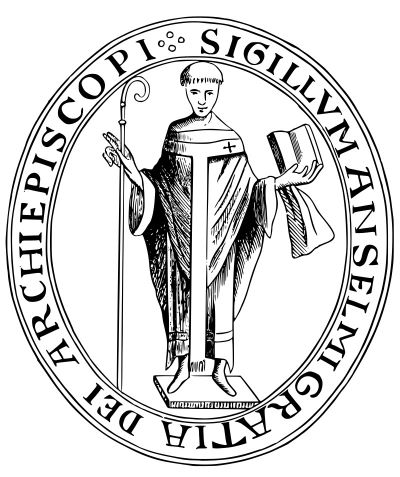
1093 AD
After a four year vacancy the see of Canterbury is to have a new incumbent whose appointment has come about in the most unusual circumstances. Sixty year old Anselm, Italian monk and Abbot of Bec, has reluctantly, after a long and stormy relationship with King William Rufus, taken on the role as Primate of England. The conferment and acceptance come about in the most bizarre circumstances which some court sources are calling a ‘black comedy.’
Relations between the two men for the past few years have been notoriously strained and it seems that neither man wanted the appointment. Anselm denies that he desires wordly advancement and in recent years he has become known as a formidable scholar whose books: Monologion, Proslogion , The Dialogues on Truth, Free Will and Fall of the Devil, and the Cur Deus Homo, have made him one of the foremost intellectuals in the Roman Church today. By temperament monkish and completely at home in the quiet cloisters of Bec, he has recently presented a more visible profile, coming to England last year ostensibly to sponsor Hugh, Earl of Chester’s new foundation at St Werburghs but also to inquire into the affairs of Bec’s estates in England, with a view to reducing their assessment for geld. Meanwhile thirty-three year old King William Rufus maintains his cavalier attitude to ecclesiastical matters, refusing to recognise either one of the two current contestants for the Holy See, showing disrespect for churchmen, failing to keep feast days and fasts, and surrounding himself with hard-drinking, bacheliers who like nothing better than hunting, feasting and playing pranks. It seems that only a miracle could bring these two men together and that, according to Anselm’s biographer, Eadmer, is what we have got.
Prayers at bedside of dying king
At the beginnning of March the king fell ill while travelling and was taken to Gloucester. He was confined to his bedchamber for the whole of Lent (March 2nd – April 17th) suffering from violent vomiting and other symptoms of food poisoning so severe that it was thought the king might die. Such an event would be a blow to the whole kingdom for William Rufus remains unmarried and has no heir to succeed him save for his brother Robert, Duke of Normandy, who is deeply unpopular in England. The King was so ill that he himself feared death and began to repent of his profligate life. It was in the midst of this dire emergency that, on Sunday March 6th, Anselm, Abbot of Bec, came forward with prayers at the bedside of the afflicted king and was prevailed on to accept the nomination of Canterbury on the condition that William would reform, repent and renounce his sinful life. When, later, the King began to mend, he undertook a series of formal pledges to abolish unjust laws, establish good ones, protect the interests of the Church and set in motion a judicial inquiry into all illegalities in order to deter wrongdoers.
Tale of the bull and the sheep
But when the king had recovered fully at the end of April, he began to renege on his undertakings and even railed against God for striking him down with illness. The least religious man in the kingdom now finds himself in a working partnership with the greatest theologian of western Christendom. In the meantime Anselm has continued to profess his reluctance but it is thought he will be inducted into office by the end of the year. After four years of vacancy since the death of Lanfranc in 1089, Canterbury will again have an Archbishop. A source close to the court commented: ‘This is a team made for disasters, a new version of the old tale of a bull and a sheep being yoked together to pull a plough. The great plough of Church and Court is not going to draw a straight furrow with such a team in charge. It’s a farce.’